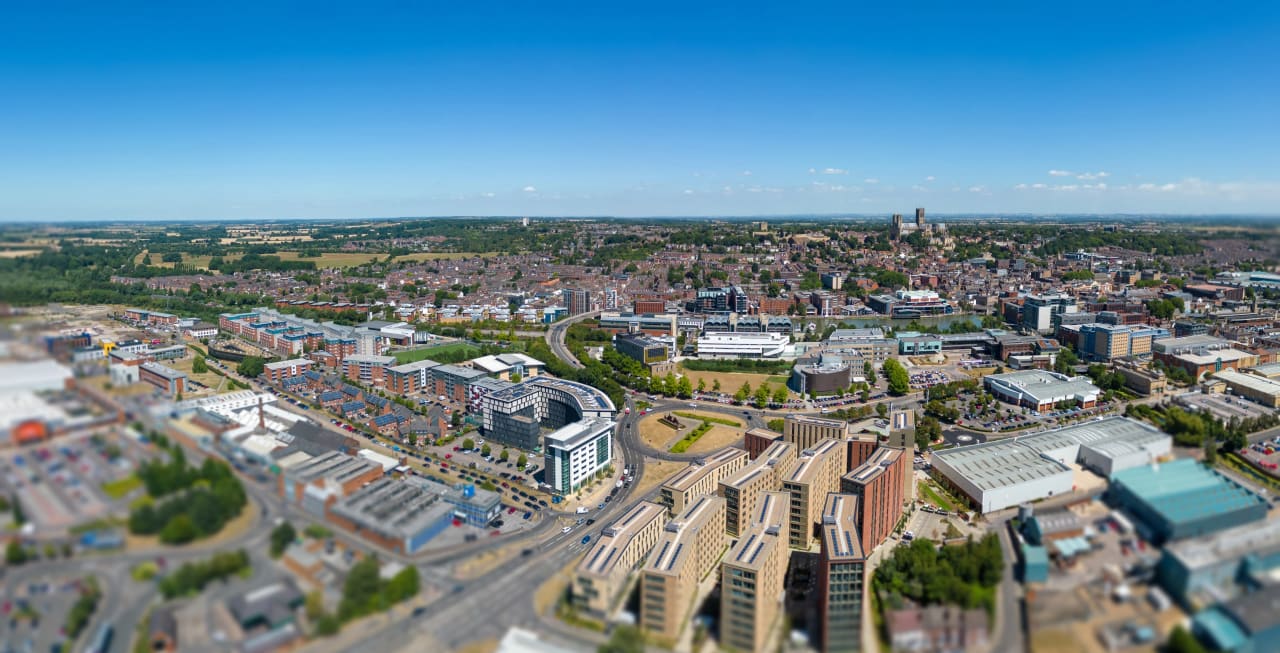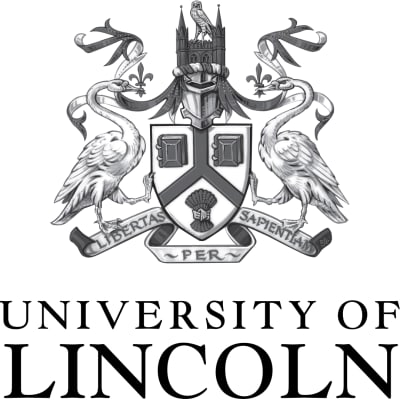
BA (Hons) Music
University of Lincoln

Key Information
Campus location
Lincoln, United Kingdom
Languages
English
Study format
On-Campus
Duration
3 - 6 years
Pace
Full time, Part time
Tuition fees
Request info
Application deadline
Request info *
Earliest start date
Request info
* late applications will be considered if suitable vacancies remain
Discover Lincoln Wherever You Are in the World
Our webinars, subject masterclasses, question and answer sessions, and student panel talks are a great way to discover what it is like to live and study at the University of Lincoln.
Introduction
Music at Lincoln is a contemporary, industry-focused degree for musicians looking to develop their skills as performers, composers, and collaborators within a flexible curriculum that encompasses classical, rock, pop, and non-Western music.
This course connects practice with theory, tradition with innovation, and personal creativity with collaborative projects. As well as working with other musicians, students have the opportunity to work with dancers, actors, filmmakers, animators, and computer game designers.
Practical skills are underpinned and enriched with an approach to studying music that positions practice alongside an understanding of musical histories, cultures, and genres, as well as developing the critical and reflective skills needed to articulate these connections.
The teaching team is made up of professional musicians and experienced researchers with expertise that encompasses numerous professions, disciplines, and media, such as musical theatre, composition, performance, orchestration, musical direction, and sound production.
"This information was correct at the time of publishing (July 2023)"
Admissions
Curriculum
How You Study
In the first year, topics include the development of key musical skills, the use of audio production technology, working with a score, the role of music in society, and the contemporary music industry. Individual instrumental and vocal tuition is also available to all students.
In the second and third years, students can tailor the degree to suit their individual interests. There are degree pathways that focus on performance or composition, as well as scope for students to explore a wide range of practical and academic skills. In their third year, students can complete either a written dissertation on a subject of their choosing or undertake a practical project, such as writing and recording an album or arranging and performing in a tour. Students can also curate an entire music festival in their final year, giving them the opportunity to present live work and develop key professional skills.
Students on this programme learn from academic staff who are often engaged in world-leading or internationally excellent research or professional practice. Contact time can be in workshops, ensemble rehearsals, discursive seminars or lectures and may vary from module to module and from academic year to year. Tutorial sessions and project supervision can take the form of one-to-one engagement or small group sessions. Practical work can take place in recording studios, performance spaces, rehearsal rooms and Mac workstations. Some courses offer the opportunity to take part in external visits and fieldwork.
It is still the case that students read for a degree and this means that in addition to scheduled contact hours, students are required to engage in independent study. This allows you to read around a subject and to prepare for lectures and seminars through wider reading, or to complete follow up tasks such as assignments or revision. As a general guide, the amount of independent study required by students at the University of Lincoln is that for every hour in class you are expected to spend at least two to three hours in independent study. Students studying music should also schedule additional time to practise on their instrument.
The teaching team is made up of professional musicians and researchers with expertise that encompass numerous professions, disciplines and mediums, including performance, composition, musicology, and teaching music. Teaching is enhanced by visiting practitioners, masterclasses, careers events, and alumni talks.
First Year
- A History of Popular Music (Core)
- A Performer Prepares (Core)
- Knowing the Score (Core)
- Music Industries (Core)
Second Year
- Curating Music (Core)
- Music in Society (Core)
- Music on Location (Core)
- Composition (Option)†
- Ensemble & Enterprise (Option)†
- Music Placements (Option)†
- Music Production and Enterprise (Option)†
- Music Theatre (Option)†
- Performance (Option)†
- Study Abroad (Option)†
- Teaching Music (Option)†
Third Year
- Music Festival (Core)
- Dissertation (Music) Written (Option)†
- Dissertation: Practice-led (Option)†
- Psychology of Music (Option)†
† Some courses may offer optional modules. The availability of optional modules may vary from year to year and will be subject to minimum student numbers being achieved. This means that the availability of specific optional modules cannot be guaranteed. Optional module selection may also be affected by staff availability.
How You Are Assessed
Much of the assessment on this course will be practical and will reflect the demands and expectations of the music industry. Depending on the chosen pathway, students may be asked to perform or to create and submit their music using various technologies. Students may be required to submit their practical work as a portfolio documenting their creative process and development.
Written assessments come in various forms and are designed to develop writing skills for academic work, but also to allow students to develop industry-specific writing skills. Students may therefore produce sleevenotes, funding applications, project reports, reflective journals, professional portfolios, websites, and writing in other relevant formats.
The weighting given to each assessment method may vary across each academic year. The University of Lincoln aims to ensure that staff return in-course assessments to students promptly.
Gallery
Program Outcome
How You Study
In the first year, topics include the development of key musical skills, the use of audio production technology, working with a score, the role of music in society, and the contemporary music industry. Individual instrumental and vocal tuition is also available to all students.
In the second and third years, students can tailor the degree to suit their individual interests. There are degree pathways that focus on performance or composition, as well as scope for students to explore a wide range of practical and academic skills. In their third year, students can complete either a written dissertation on a subject of their choosing or undertake a practical project, such as writing and recording an album or arranging and performing in a tour. Students can also curate an entire music festival in their final year, giving them the opportunity to present live work and develop key professional skills.
Students on this programe learn from academic staff who are often engaged in world-leading or internationally excellent research or professional practice. Contact time can be in workshops, ensemble rehearsals, discursive seminars or lectures and may vary from module to module and from academic year to year. Tutorial sessions and project supervision can take the form of one-to-one engagement or small group sessions. Practical work can take place in recording studios, performance spaces, rehearsal rooms and Mac workstations. Some courses offer the opportunity to take part in external visits and fieldwork.
It is still the case that students read for a degree and this means that in addition to scheduled contact hours, students are required to engage in independent study. This allows you to read around a subject and to prepare for lectures and seminars through wider reading, or to complete follow up tasks such as assignments or revision. As a general guide, the amount of independent study required by students at the University of Lincoln is that for every hour in class you are expected to spend at least two to three hours in independent study. Students studying music should also schedule additional time to practise on their instrument.
The teaching team is made up of professional musicians and researchers with expertise that encompass numerous professions, disciplines and mediums, including performance, composition, musicology, and teaching music. Teaching is enhanced by visiting practitioners, masterclasses, careers events, and alumni talks.
Scholarships and Funding
For eligible undergraduate students going to university for the first time, scholarships and bursaries are available to help cover costs. The University of Lincoln offers a variety of merit-based and subject-specific bursaries and scholarships.
Several scholarship options are available. Please check the university website for more information.
Program Tuition Fee
Career Opportunities
Through enterprise and career-focused teaching, you'll have the opportunity to engage with various parts of the music industries. Previous students have benefited from connections with Frequency Festival, Lincolnshire International Chamber Music Festival, the International Guitar Foundation, Lincoln Arts Centre, Lincoln Drill Hall, and range of local venues and organisations.
We aim to provide our graduates with the necessary skills and experience to pursue careers as freelance songwriters, musical directors, arrangers, orchestrators, composers, studio technicians, teachers, vocal coaches, producers, agents, event managers, and arts managers among many other roles.